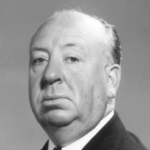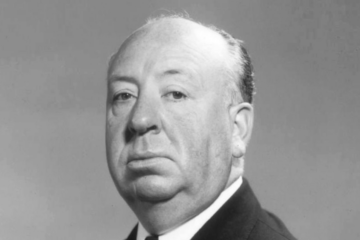Alfred Hitchcock Explains the Difference Between Suspense & Surprise: Give the Audience Some Information & Leave the Rest to Their Imagination


The Hitchcockian mode of filmmaking involves the maximum use of suspense to keep viewers in a heightened state of anxiety. “There is no terror in the bang, only in the anticipation of it,” Hitchcock himself once said. How did he create suspense? In the interview clip above from 1973, Hitchcock explains how his films “convey visually certain elements in storytelling that transfers itself to the mind of the audience, whereas other films make visual statements, so that the audience becomes a spectator.” Turning audiences into spectators, he says, accounts for the excesses of blood and gore onscreen in horror films: “there’s no subtlety.” The critique goes beyond squeamishness. In Hitchcock, spectacles are secondary, at best, to information.
Visual information also takes precedence over exposition or narrative coherence in Hitchcock’s creation of suspense. “The open-palmed hand reaching for the door, the simulated fall down the staircase, the whorling retreat of the camera from a dead woman’s face,” Samuel Medina writes at Metropolis. “These stark snippets imbue the films with their uncanny allure and imprint themselves in the mind of the spectator much more effectively than any of the master’s convoluted plots.”
Hitchcock does not deploy images to shock, he says, but to make the audience complicit in the construction of the film. “I prefer to suggest something and let the audience figure it out,” he says. “The big difference between suspense and shock or surprise is that in order to get suspense, you provide the audience with a certain amount of information and leave the rest of it to their own imagination.”
Hitchcock’s preferred techniques of conveying information often rely on what feminist scholar and filmmaker Laura Mulvey famously called “the male gaze” in her 1975 essay “Visual Pleasure and Narrative Cinema.” She revised and softened her critique in a recent collection, writing, for example, that Vertigo arrived at a time of “melancholic liberation” for the Hollywood studio system, “as the professional world of the masters faced its own end.” Hitchcock might have striven for relevance by trying to revive his heyday. Instead, he returned to the cinematic language with which he’d begun his career in the 1920s as a set designer for silent German Expressionist films.
Like Rear Window, another of the director’s vehicles built around a male character’s obsessive surveillance of women, Vertigo both enacts and subverts its subject. “On one level,” Koraljka Suton writes at Cinephilia and Beyond, the film is “about the factuality of the unrelenting male gaze that dominates and dictates both our shared collective reality…. But it should also be viewed as a clever deconstruction of it.” What does Hitchcock’s use, and subversion, of the voyeuristic male gaze have to do with suspense? The two are perhaps inseparable in Hitchcockian cinema.
In an earlier, 1970, interview, the director offered another distinction: “Mystery is when the spectator knows less than the characters in the movie. Suspense is when the spectator knows more than the characters” — usually because they have been spying on the characters. Such illicit knowledge reverses the gaze. Neither able to remain aloof nor stop the horrors they see coming, “the audience is made aware of itself as audience,” writes Popmatters, “and they are forced to wonder at their own existence as spectacle.” Or as Hitchcock put it in his inimitable way, “Give them pleasure. The same pleasure they have when they wake up from a nightmare.”
Related Content:
How Edward Hopper’s Paintings Inspired the Creepy Suspense of Alfred Hitchcock’s Rear Window
Andy Warhol Interviews Alfred Hitchcock (1974)
Josh Jones is a writer and musician based in Durham, NC. Follow him at @jdmagness
Alfred Hitchcock Explains the Difference Between Suspense & Surprise: Give the Audience Some Information & Leave the Rest to Their Imagination is a post from: Open Culture. Follow us on Facebook and Twitter, or get our Daily Email. And don't miss our big collections of Free Online Courses, Free Online Movies, Free eBooks, Free Audio Books, Free Foreign Language Lessons, and MOOCs.
from Open Culture https://ift.tt/3dAIIpN
via Ilumina


Comments
Post a Comment